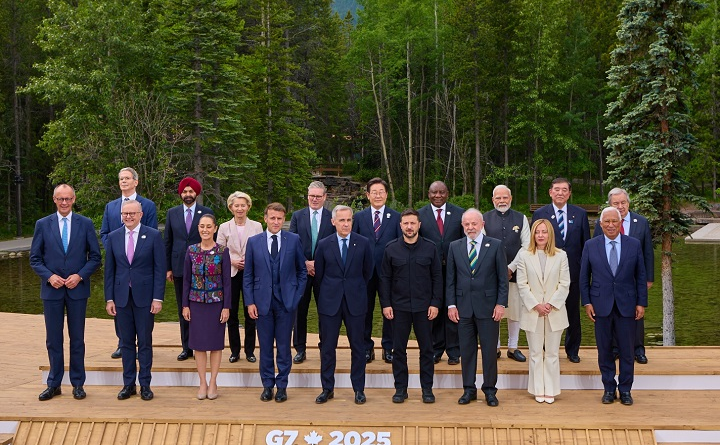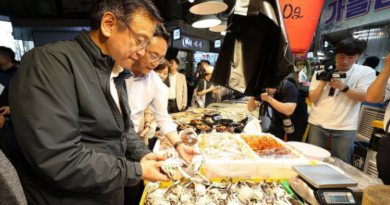President Lee’s First Diplomatic Stage: Highlights Importance of Energy Security and Critical Mineral Supply Chain Stability at G7 Summit
On June 17 (local time in Canada), President Lee Jae-myung attended the G7 Working Lunch and Outreach Session under the theme “The Future of Energy Security,” where he introduced South Korea’s energy-related policies.
The 2025 G7 Summit was held under the main themes of enhancing community safety and global security, creating prosperity through energy security and digital transition, and investing in partnerships for the future. The outreach session focused specifically on “The Future of Energy Security.”
Leaders from invited countries, including South Korea, as well as heads of three international organizations such as the United Nations, attended the summit to discuss key global political and economic issues.
During the outreach session, President Lee, who visited Canada to attend the G7 Summit, delivered two speeches in which he presented South Korea’s policy vision aimed at contributing to global prosperity through cooperation in energy supply chains, AI-energy integration, and technological innovation.
In his first speech, President Lee emphasized that achieving energy security and stabilizing critical mineral supply chains are vital for global economic growth and prosperity. He expressed South Korea’s strong commitment to international solidarity and cooperation in these areas.
President Lee pointed out the growing threat to energy supply chains amid the rapid increase in power demand driven by AI development, combined with climate volatility and geopolitical instability. He stressed the need to establish a stable, economical, and reliable energy system for true energy security.
To that end, he proposed building a robust renewable energy industrial ecosystem, establishing efficient infrastructure such as an “energy highway,” and developing resilient energy systems capable of withstanding cyberattacks.
He also highlighted the importance of stable critical mineral supply chains essential to a green energy ecosystem. President Lee noted that South Korea is contributing to this goal by serving as the chair of the Minerals Security Partnership (MSP), and expressed his intent to strengthen bilateral and multilateral cooperation with G7 members, partner countries, and critical mineral-producing nations.
In his second speech, which addressed the direction of AI development, President Lee identified three key tasks that the international community must prepare for in the era of rapid AI-driven change.
He emphasized the importance of building a stable global AI ecosystem to foster technological innovation and declared South Korea’s willingness to contribute to international cooperation for securing AI semiconductor supply chains.
He also stated that South Korea will work to improve energy efficiency by developing low-power AI semiconductors (NPUs) and securing the energy supply chains necessary for the AI industry.
President Lee underscored the crucial role of the private sector in AI innovation and announced plans to promote a national AI transformation through bold tax incentives, regulatory reforms, and the establishment of a public fund. He also pledged to position South Korea as the top AI hub in the Asia-Pacific region.
Furthermore, President Lee expressed a strong commitment to cooperating with the international community to ensure that all humanity can benefit from AI. He mentioned that South Korea would present a vision and concrete implementation plans for global AI cooperation at the APEC Summit to be held later this year in Gyeongju and called for active participation and interest from world leaders.

Meanwhile, South Korea participated as an invited country in the two outcome documents adopted at this G7 Summit: the “G7 Critical Minerals Action Plan” and the “Kananaskis Wildfire Charter.”
The G7 Critical Minerals Action Plan outlines international cooperation to diversify supply chains, while the Kananaskis Wildfire Charter emphasizes the need for a whole-of-society approach to wildfire prevention, response, and resilient recovery.
The Office of the President stated that President Lee’s participation in the G7 Summit, just 10 days after taking office, holds great significance as it marks the first international stage showcasing the restoration of South Korea’s democracy and summit diplomacy.
It also assessed that by sharing South Korea’s vision for diversifying energy supply chains and building a global AI ecosystem, the country actively participated in global discussions in the new era of technology, thereby advancing a “national interest-centered, pragmatic diplomacy” that aims to create favorable conditions for the Korean economy.
The Presidential Office added, “Our government will continue to strengthen South Korea’s international status as a de facto ‘G7 Plus’ nation by actively participating in discussions on global issues during this major transformation in the global economic and security landscape.”
[Editor Junbeom]








